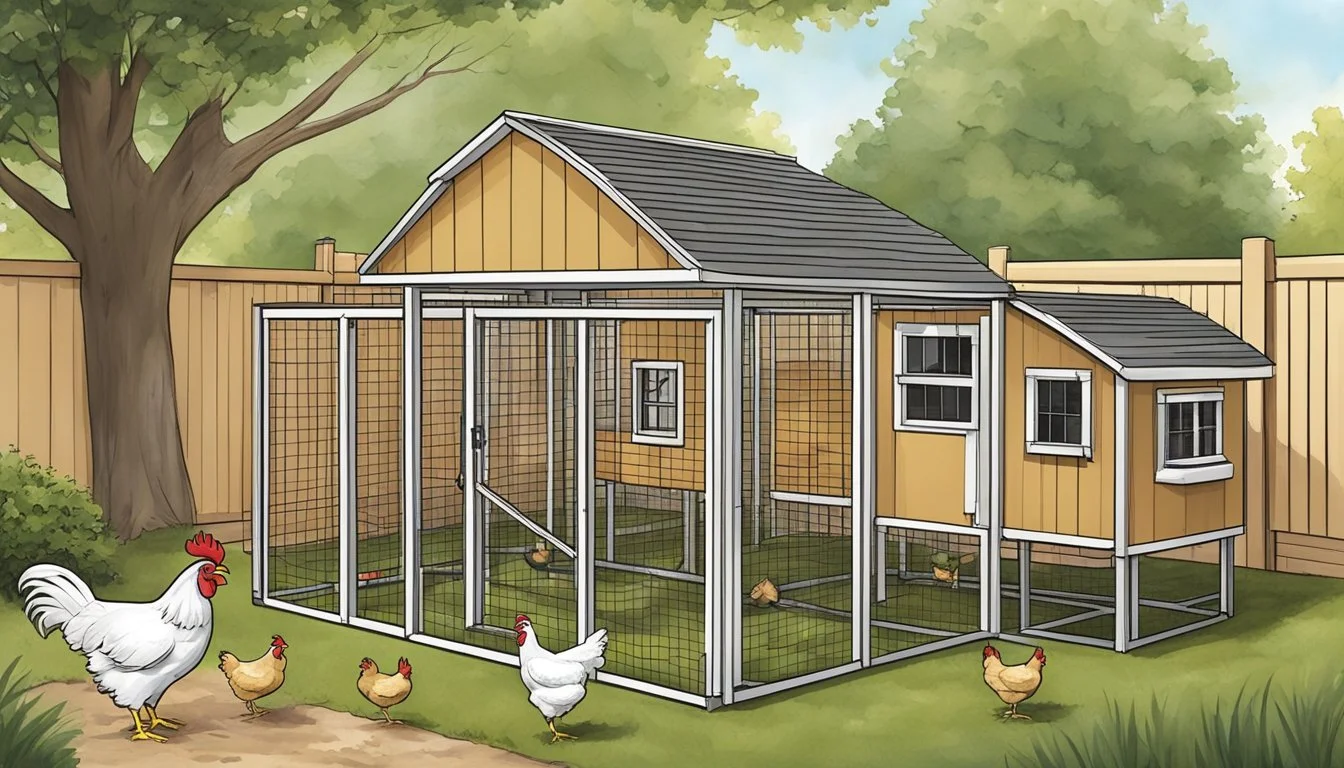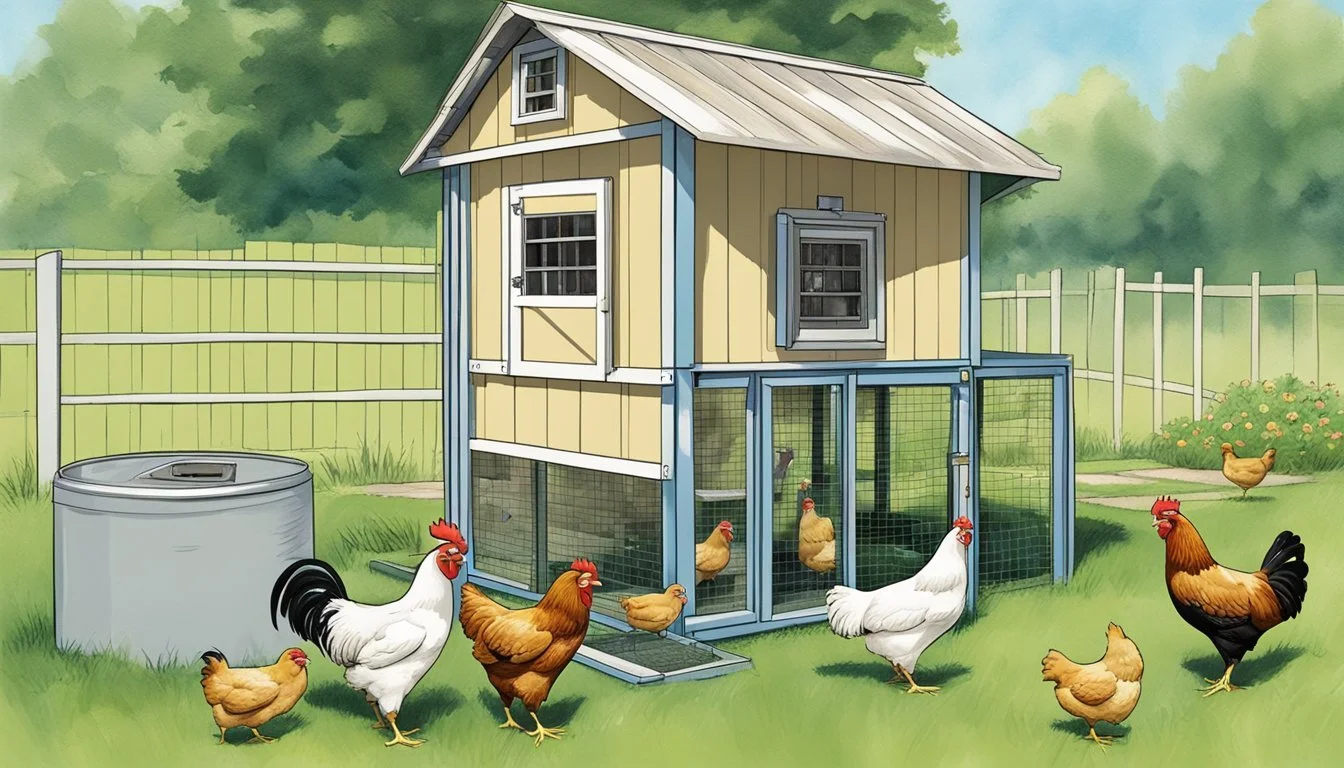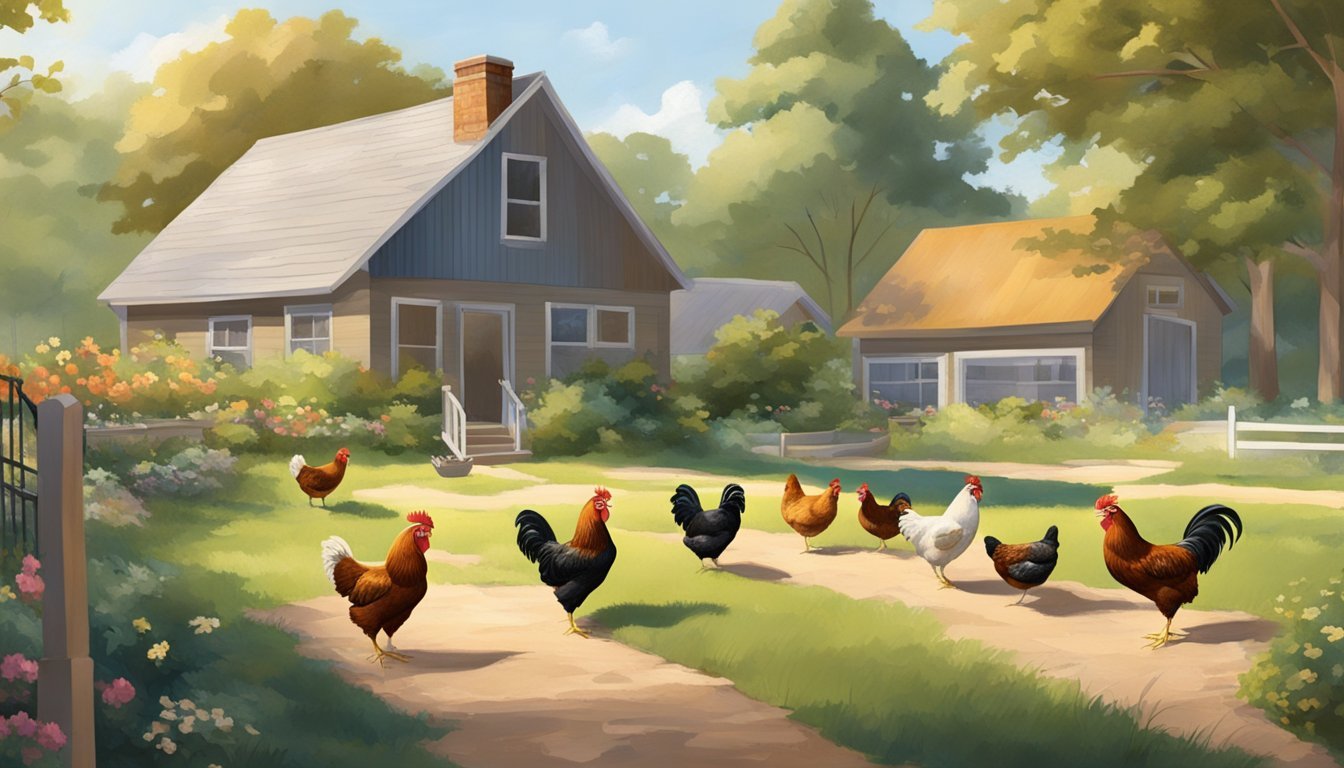Keeping Backyard Chickens in Springfield, MO
Local Regulations and Best Practices
In Springfield, Missouri, the pursuit of sustainable living and a closer connection to the source of food has led many residents to embrace the practice of backyard chicken keeping. This movement towards self-sufficiency encourages families to produce their own eggs and fosters an educational environment for children to learn about animal husbandry and local agriculture. Within the city limits of Springfield, specific guidelines have been established to regulate the keeping of these birds, ensuring the well-being of both the chickens and the community.
Residents of Springfield are permitted to own up to six female chickens per tract of land, reflecting an understanding of the space and resource limitations inherent in urban areas. Roosters are prohibited to prevent noise disturbance. The city's regulations are shaped by concerns for public health and neighborly consideration, requiring all chickens to be housed in secure enclosures and to remain within these confines at all times. The enclosures must be maintained in a clean, dry, and sanitary condition to deter odors and pests.
By adhering to these regulations, Springfield citizens contribute positively to their neighborhoods while enjoying the benefits of raising backyard chickens. This includes not only a supply of fresh eggs but also the joy of nurturing animals and contributing to a greener, more localized food system. The city's approach balances individual hobbies with broader community values, creating a harmonious environment for all involved.
Legal Framework for Backyard Chickens in Springfield
Residents of Springfield, Missouri who are interested in keeping backyard chickens must adhere to the specific legal framework established by local ordinances and zoning regulations. Ensuring compliance with these rules is essential for lawful and community-friendly chicken keeping.
Understanding Local Chicken Laws
The City of Springfield, Missouri allows the keeping of chickens within its city limits under certain conditions. The key components of the local chicken ordinance include:
A maximum of six hens is permitted per tract of land.
Roosters are prohibited, to minimize noise disturbances.
Chickens must be housed in a secure enclosure or fenced area at all times.
Enclosures must meet sanitation standards, being kept clean, dry, and odor-free.
Navigating Zoning Regulations and Property Lines
The city's zoning regulations play a significant role in the keeping of backyard chickens:
There is a requirement for a 50-foot setback from any neighboring dwellings for the coop or chicken enclosure.
A minimum coop size of 144 square feet is mandated by the City Code.
Compliance with these zoning laws is critical to prevent any disputes or legal issues regarding property lines.
Permitting Process for Owning Chickens
To legally own and maintain backyard chickens in Springfield, residents must:
Understand if a permit is required for the keeping of chickens within their specific residential zone.
Contact the Brenda Cirtin Busch Municipal Building or the appropriate local government office to acquire any necessary permits and to ensure all regulations are met.
Be prepared for any fees associated with the permitting process, which support the regulation and oversight of chicken keeping in the city.
Complying with Springfield's chicken laws and regulations ensures that owners can enjoy raising their chickens without violating local statutes.
Setting Up Your Chicken Coop
When setting up a chicken coop in Springfield, Missouri, one must comply with local ordinances, focus on practical design for safety, and ensure proper upkeep for the health and comfort of the chickens.
Choosing the Right Location
The right location for a chicken coop should adhere to Springfield's specific guidelines. This means selecting a site with a minimum of 144 square feet that maintains a 50-foot setback from property lines. It is also imperative to choose a spot away from loud noises and heavy traffic areas to reduce stress on the chickens.
Designing a Predator-Proof Chicken Coop and Run
A predator-proof chicken coop and run is critical for the safety of backyard chickens. The coop should be fortified with strong mesh wire to prevent predators from gaining access. Make sure the wire extends underground to stop burrowing animals. Additionally, the coop requires a secure, lockable door for nighttime protection. The run should provide ample space—at least four square feet per chicken—to allow for free movement, while also being appropriately enclosed to prevent escape and intrusion.
Maintaining a Clean, Dry, and Sanitary Coop
A clean, dry, and sanitary coop contributes significantly to the overall health of the flock. To maintain such an environment, include easily cleanable surfaces and adequate ventilation to minimize moisture build-up and odors. Regular cleaning of bedding material will help keep the coop odor-free and neat. Lastly, always ensure a clean supply of water and fresh food to keep chickens healthy and mitigate the attraction of pests to the coop area.
Chicken Care and Management
Proper care and management of backyard chickens are essential for their well-being and to maintain good relationships with neighbors. Adherence to Springfield, MO's regulations ensures a harmonious and sanitary environment for both the chickens and the surrounding community.
Daily Feeding and Watering
Chickens require a consistent supply of fresh food and water. Owners should provide:
Feed: A balanced diet of commercial poultry feed.
Supplements: Occasional treats like vegetables and grains for variety.
Water: Clean water must be available at all times, replenished daily.
Owners must maintain a clean feeding area to prevent attracting pests.
Health Checks and Veterinary Care
Regular health checks are crucial to catch issues early. Owners should monitor their chickens for:
Appearance: Alertness, good posture, and clean feathers.
Behavior: Normal vocalization and activity levels.
Veterinary care must be sought for any signs of illness or injury. Preventative care, including vaccinations and parasite control, is recommended.
Managing Noise and Neighbor Relations
Noise control: Roosters are not allowed due to noise concerns. Hens produce less noise but owners should still:
Position coops away from neighboring houses.
Implement noise-reducing strategies, such as soundproofing the coop if necessary.
Neighbor relations: Keeping the coop clean and ensuring it does not emit odors will help maintain positive relations with neighbors. It is also beneficial to manage chicken manure properly by:
Regular removal of waste.
Composting manure can provide garden benefits while keeping the coop area sanitary.
By adhering to these care and management practices, owners can ensure their chickens thrive in a backyard setting and uphold the standards set by the city of Springfield, MO.
Community Interaction and Education
When keeping backyard chickens in Springfield, Missouri, it’s essential for the community to be well-informed about local chicken laws to ensure the harmonious coexistence of both the residents and their feathered neighbors. Public Nuisance concerns can be mitigated through education and responsible community interaction.
Residents should familiarize themselves with Springfield’s chicken ordinance, which allow up to six hens, with a minimum enclosure space and no roosters permitted due to noise considerations. Enclosures must also maintain a 50 foot setback from neighboring properties and meet specific size requirements to ensure the wellbeing of the chickens and respect for neighbors’ space.
The internet serves as a vital resource for current and prospective chicken keepers. Websites like ChickenLaws.com offer detailed insights into Springfield's specific regulations. They provide a forum for community members to share experiences, tips, and ask questions.
Communities are strengthened when neighbors communicate and learn from one another about the laws and best practices for keeping chickens. Local workshops or meetings can be effective for those seeking guidance or looking to share their knowledge about effectively managing backyard flocks within city limits.
Key Focus Resource Benefit Local Chicken Laws City Ordinances Helps avoid legal issues and complaints. Chicken Keeping Best Practices Online Forums Offers practical advice and support. Mitigating Public Nuisance Community Meetings Promotes responsible chicken keeping. Understanding and Applying Regulations Local Workshops Ensures compliance and neighborly peace.
By educating themselves and participating in community interactions, Springfield residents can enjoy the benefits of backyard chicken keeping while adhering to the established local laws and maintaining positive relationships within the community. This article aims to serve as a starting point for those looking to integrate into the world of urban poultry in Springfield, MO.
Advanced Topics in Backyard Poultry
When maintaining a flock in Springfield, MO, enthusiasts often explore beyond the basics to enhance efficiency and sustainability. Advanced topics include modern coop designs, waste management, and specialized breeding practices.
Innovative Coop Designs and Chicken Tractors
Advanced poultry keepers in Springfield may experiment with chicken tractors, mobile coops that allow chickens to forage on fresh grass while fertilizing the land. These enclosures provide protection from predators and can be moved daily, promoting land health and reducing feed costs. Innovative coop designs may incorporate automatic waterers, egg collection systems, and temperature controls for comfort and increased productivity.
Sustainable Practices and Organic Waste Management
Sustainable poultry management emphasizes the use of chicken manure as a valuable resource. Combining droppings with organic matter like leaves or straw can create rich compost for gardens. Springfield keepers should implement a rotational composting system to handle waste effectively, preventing buildup and reducing the risk of disease.
Breeding and Raising Chickens for Fresh Eggs
Specialized breeding involves selecting for specific traits to produce robust layers. By choosing chickens with a history of high-quality fresh egg production, Springfield residents can enjoy a regular supply for their households. Keeping detailed records on health, productivity, and breeding cycles helps refine practices for better yield and chicken welfare.
City and State Comparisons
When examining the regulations for backyard chicken-keeping within Missouri, Springfield presents its unique stance, especially when contrasted with other cities and statewide trends.
Differences Between Springfield and Neighboring Cities
Springfield, Missouri, allows residents to keep up to six female chickens per tract of land without a permit and does not require a specific breed. Roosters are not mentioned in one ordinance, but another ordinance disallows them due to noise. Coops must comply with certain restrictions, like having a 50-foot setback from property lines.
In comparison, neighboring cities may have varying regulations. For example:
Liberty, according to their city code, permits residents to keep chickens provided they comply with space and sanitation requirements.
Independence has its own set of guidelines for residents who wish to keep backyard chickens, emphasizing the cleanliness of the coop and the containment of the birds.
Backyard Chicken Regulations in Kansas City and St. Louis
Kansas City allows the keeping of up to 15 chickens or ducks, with no roosters allowed if the property is less than an acre. There needs to be 10 square feet per chicken in an outdoor pen.
St. Louis residents can keep up to eight chickens with certain stipulations regarding coop placement and care standards. They also require residents to keep coops clean and odor-free.
The Situation in Independence and Liberty
In Independence, residents are allowed to keep chickens, conditional upon providing adequate housing and maintaining sanitary conditions to not disturb the neighborhood with noise or odors.
Liberty's regulations include limits on the number of chickens and the requirement for proper enclosures and maintenance.
Across these cities in Missouri, each has tailored its regulations for backyard chickens, considering the community's needs and preferences. Regulations often focus on the number of hens, enclosure specifications, and maintenance to preserve the well-being and harmony within the diverse urban and suburban settings.
Concluding Thoughts
Keeping backyard chickens in Springfield, Missouri, presents residents with a unique opportunity for sustainable living. Adherence to city ordinances ensures harmony between chicken enthusiasts and the community at large. Given the city's allowance for up to six hens—excluding roosters—and without the need for special permits, residents can enjoy the benefits of fresh eggs and the joy of tending to these animals with relative ease.
Key Pointers for Springfield Chicken Keepers:
Hens Permitted: Up to six per tract of land.
Roosters: Not allowed to mitigate noise concerns.
Housing Requirements: Maintain a minimum coop space of 144 square feet with a 50-foot setback.
Residents must maintain clean, dry, and odor-free enclosures, demonstrating a commitment to both their chickens' welfare and their neighbors' quality of life. Enclosures must be secure to protect chickens from predators and to ensure they do not stray.
Easy access to relevant information empowers Springfieldians to practice responsible chicken keeping. Those considering this rewarding endeavor can find a wealth of resources at their disposal. This article's objective has been to provide clarity and guidance for prospective and current backyard chicken owners, suitable for anyone from novices to experienced poultry enthusiasts.
By adhering to the guidelines, individuals contribute positively to Missouri's growing movement towards suburban and urban agriculture—a testament to the community's resilience and forward thinking.








